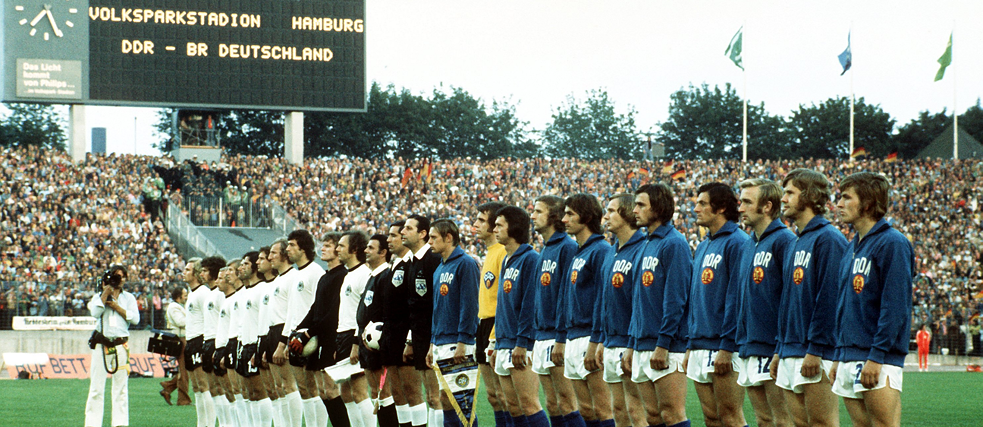East-West German Football History
Separated by Politics, United by Football

Ronald Reng has written a football book that is about much more than football. 1974 – Eine deutsche Begegnung is a captivating portrait of divided Germany in the 1970s.
By Hendrik Nolde
On 22 June 2024, the national teams of Georgia and the Czech Republic will play against each other in the group stage of the European Championship in Hamburg’s Volksparkstadion. It’s doubtful that anyone will write a book about this match in 50 years’ time. And it will probably create far fewer talking points than the World Cup match that took place here on 22 June 1974: between the Federal Republic of Germany and the German Democratic Republic. This was an historically unique event, because it was only on this one June evening that the two German nations ever came together on the football field. The perfect reason for sports journalist Ronald Reng to take a closer look. Reng ended up spending over three years interviewing contemporary witnesses from East and West Germany, delving deeply into the archives of Germany as a whole. The result is 1974 – Eine deutsche Begegnung (1974 – A German Encounter), a superlative work of non-fiction that is a delight to read and apparently leaves no question unanswered – about football and much more.
Talking about life through sport
Reng says that his method of working involves immersing himself wholeheartedly into the subjects of his books. In the podcast Fußballfrequenz, he describes the objective of his new book as “capturing the essence of what life was like in the two German states in 1974 through this one football match”. Readers can delight in Reng’s attention to detail. They learn about apparently insignificant aspects of daily life, which collectively paint an impressive panorama that transcends tired clichés about divided Germany. The book is about fashion and leisure, work and economic conditions, and about cultural and social life on both sides of the Wall.
But football is by no means sidelined. The 90 minutes in Hamburg are the key focus of the narrative, and despite lots of anecdotal detours, Reng returns to it again and again. The book follows the two teams – from their training camps to the clandestine post-match jersey swap in the catacombs. It takes a close look at Günter Netzer’s luckless appearance – the only 20 World Cup minutes of his career – and the plight of East German scorer Jürgen Sparwasser, who decades later is still only ever asked about his winning goal. Far more interesting, though, are the glimpses into the lives of the football protagonists – the players, reporters and officials – in East and West. Reng reveals some unexpected parallels, but is not afraid to highlight the glaring disparities. One of the book’s greatest strengths is its ability to avoid oversimplification and present a subtle, nuanced view.
Challenging collective thinking
The essence of 1974 lies in its portrayal of characters, many of whom initially appear to have little to do with the Germany v. Germany match or the sport of football in general. Take, for instance, East Berlin actor Jutta Wachowiak, who appeared in Die neuen Leiden des jungen W. at the Deutsches Theater on the evening of 22 June – a play that symbolises East Germany’s short-lived cultural renaissance. Or Hamburg communist Doris Gercke, who acted as a tour guide for East Germany’s hand-picked fans before they went to the stadium. She never attended a football match again but later became a successful crime writer. Reng strongly believes that “generalisations do not do justice to the truth. Each person deserves to be seen individually”. This ethos is exactly how he treats his interviewees, whether it’s GDR opposition activist Ronald Jahn or reformed RAF terrorist Klaus Jünschke. He describes their lives with empathy and genuine curiosity, never naively, taking the time to delve into narratives that go well beyond 1974.
Reng has selected his protagonists cleverly, because they offer profound insights into what was going on at the time. One example is the little boy who feels closest to his father when he can help him look knowledgeable about football while appearing on TV. Matthias Brandt, son of German chancellor Willy Brandt, is described as an ordinary West German boy who likes to play football with his friends in his front garden in Bonn – albeit in a Partizan Belgrade jersey given to him by Yugoslav President Tito during a state visit. His memories of the 1974 World Cup are clouded by fears of not being able to attend a match in the stadium, as he was so hoping. His father had resigned as Chancellor in connection with the Günter Guillaume espionage affair only a few weeks before.
The match, incidentally, ended in a 1:0 victory for East Germany, but held little sporting significance since both teams had already qualified for the next round of the tournament. The West German players spent a few days licking their wounds, but they drew their sporting conclusions and went on to become the world champions. Secretly pleased, the East Germans were instructed to feign indifference to prevent the significance of victory over West Germany from appearing unnecessarily inflated. It was supposed to be a routine match, not an epoch-making event that someone would write a book about half a century later.
München: Piper, 2024. 432 p.
ISBN: 978-3-492-07219-9